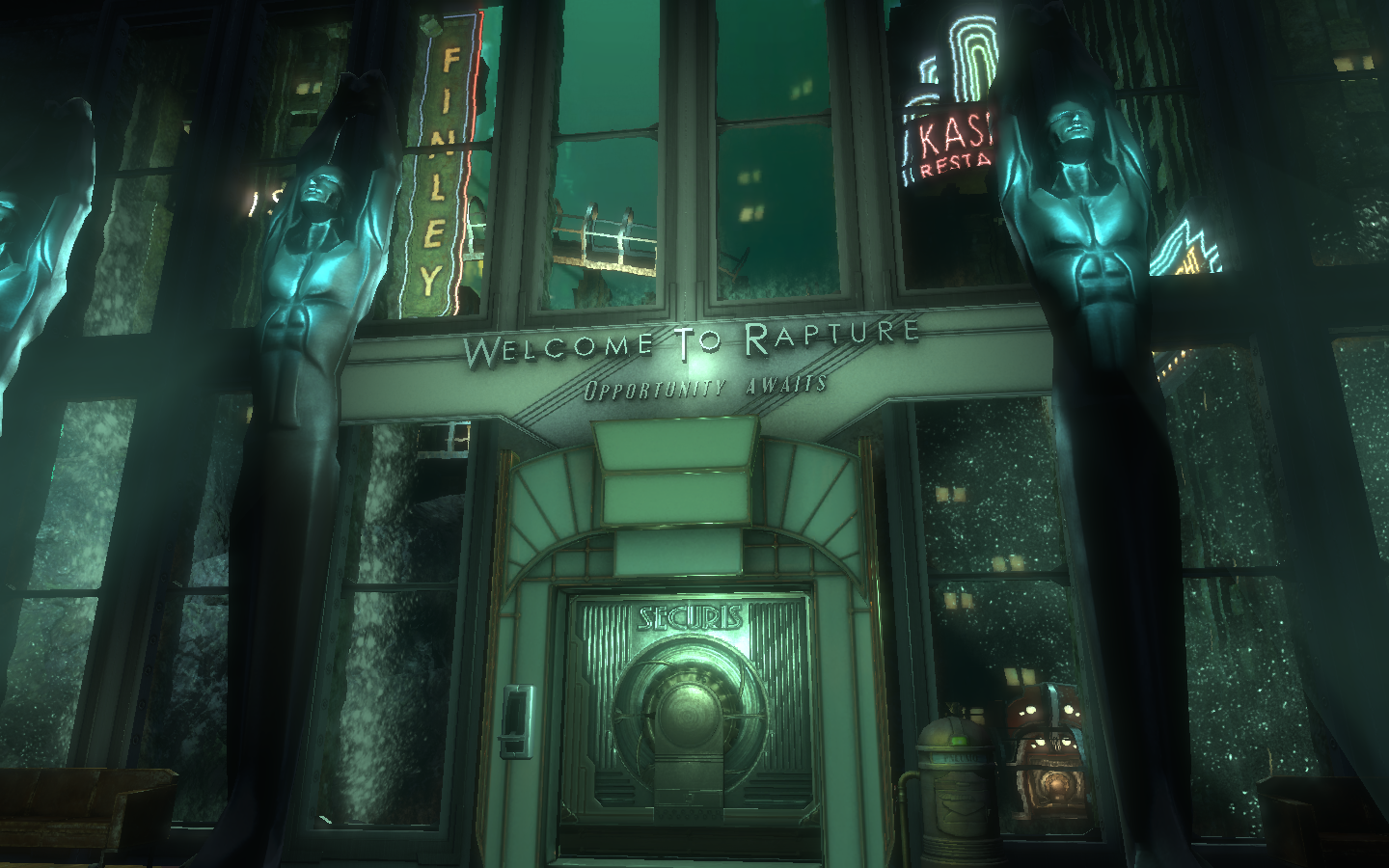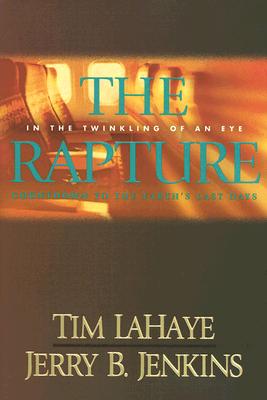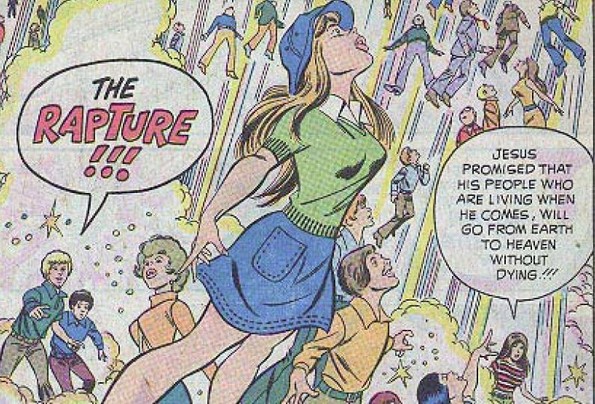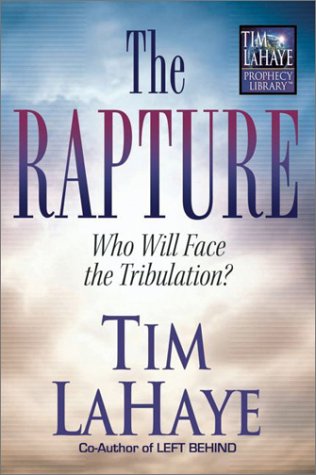The Rapture Is Fun, But Resurrection Is Better
Once I believed in the Rapture. Now I don’t. In short, it’s the fault of resurrection belief.
In fact, I wonder if Christian belief in the rapture gets weaker as resurrection belief gets stronger. So far, I can’t say for sure. But I’ve noticed this tendency in others and in myself.
Many good and biblical Christians believe in the Rapture as a separate event. Here, Jesus supernaturally snatches his people away from Earth. Some say we get snatched out of our very clothes, leaving behind even pacemakers and things. (The exact doctrinal reasons are left undefined.) These Christians believe the Rapture event will occur sometime before a seven-year time of divine judgments and other terrors on Earth, which lead to the second coming of Jesus.1
But in this view, the final resurrection of the saints (Jesus’s saved people) won’t happen until the very end of yet another prophesied period, the one-thousand-year Millennium (Rev. 20: 1-6). During this time, Jesus reigns on the earth, but not everyone follows him.2
I have enjoyed, and still enjoy, the concept of the Rapture. I was a big Left Behind series fan and still appreciate how God used this series in my life. And I even used to draw doodles of, say, myself magically vanishing. (I’m not sure if I seriously expected this to happen soon.)
But now I’ve become one of Those Christians, who critique the Rapture idea as most people understand it. However, I hope I’m less snarky than the Christians I used to read!
I still believe in Jesus’ return and in the Resurrection. And if you use the word “Rapture” to refer to the catching-up of believers to be resurrected, of course I believe in that. But I no longer believe in the vanish- before-Tribulation Rapture. Here are three reasons why.
1. Revelation is likely meant to be symbolic.
Several Christian authors defend their view of a pre-Tribulation Rapture because they don’t believe God would let His people suffer through the Tribulation. I’m not sure this makes a lot of sense. After all, they do believe God will start a new Church, mostly of Jesus-believing Jews, who do suffer during the Tribulation. So what’s the point?
A quicker way to challenge this view is simply to ask if the Bible forecasts a real Tribulation anyway. Does the book of Revelation clearly teach we’re due for a seven-year dystopia?
The late great author Tim LaHaye and others defend their view of Revelation like this:
The best guide to Bible study is “The Golden Rule of Biblical Interpretation.” To depart from this rule opens the student to all forms of confusion and sometimes even heresy.
When the plain sense of Scripture makes common sense, seek no other sense, but take every word at its primary, literal meaning unless the facts of the immediate context clearly indicate otherwise.3
This is how LaHaye and others attempt to read the book of Revelation: Let’s try to take it literally, unless you simply can’t, based on common sense and context. Simple, right?
Not necessarily. LaHaye might phrase this better elsewhere. But here he ignores what theologians call the more clearly stated grammatical-historical method of reading Scripture. Others emphasize the role of genre in determining whether you read a work as “literal” or not. In other words, if you are trying to read biblical poetry “literally,” you are actually reading it like a liberal. You’re ignoring the actual intent of the Author and authors.
In fact, LaHaye’s “literal” vs. “non-literal” dichotomy doesn’t help when you explore some passages, such as the Psalms. These often refer to God using human terms. One moment, God sends thunder and lightning. Then the next He inhales the scent of burnt offerings or covers you with His wings. In either case, you could “take every word at its primary, literal meaning unless the facts of the immediate context clearly indicate otherwise.” You could conclude that God sends thunderbolts and has nostrils and wings. That’s the “literal meaning,” right? And yet the Psalmist mixes facts with fantastical, symbolic imagery.
What then about Revelation? Some good Christians argue (I think convincingly) that this book is meant to serve a mix of fact and symbolism. Therefore, if you try first to read it “literally,” you’re actually not being very “literal.” Because it’s meant to be figurative.
As with the epistles, the primary meaning of the Revelation is what John intended it to mean, which in turn must also have been something his readers could have understood it to mean.4
In that case, the tribulation paradigm—and all those questions about whether God wants the Church to go through the tribulation—is itself called into question.5 Yet here is what startled me: you can’t find the Rapture in Revelation anyway.6 For Rapture teaching, you need to look to two other passages, both written by the apostle Paul. And here is where the traditional, vanish-from-clothes Rapture runs into more challenges. Christians may debate Revelation’s genre. But the epistles are a bit easier to understand.
2. 1 Corinthians 15 is about the Resurrection, not a separate Rapture.
 Here the apostle Paul writes of the Resurrection as a future event. In the Resurrection, Jesus brings His people to life, reuniting their souls with new, spiritual (that is, Holy Spirit-powered) physical bodies. That way, we can live for eternity on a physical New Earth.7
Here the apostle Paul writes of the Resurrection as a future event. In the Resurrection, Jesus brings His people to life, reuniting their souls with new, spiritual (that is, Holy Spirit-powered) physical bodies. That way, we can live for eternity on a physical New Earth.7
Rapture teachers like to single out verses 51-56. These describe the “twinkling of an eye,” trumpeted moment when “we shall be changed.” However, in Rapture teaching, people first vanish from their clothes to be with Jesus. Later they are still waiting for at least the first phase of the Resurrection after the Tribulation period (Rev. 20: 4-5). Big problems here:
- “In a twinkling of an eye,” the “rapture” and Resurrection happen all at once.
- There are no gaps between these events.
- Repeat: there are no gaps between these events, not seven years, 1,000 years, or any years. It happens in a flash, in the “twinkling of an eye,” saith the Lord through Paul.
- Even more challenging, this moment marks the very end of death itself! At this rapture/resurrection, “death is swallowed up in victory” (1 Cor. 15:54). But rapture teaching still has plenty of death left to go. Millions die during the tribulation, and some people die at the end or even during the Millennium period on Earth. I think this argument alone destroys the idea of a separate rapture before the Resurrection. I’ve not yet seen any counter to this argument (though I welcome anyone’s attempt).
3. 1 Thessalonians 4 describes the single, public return of Jesus.
This Easter weekend we will celebrate Jesus’s death and resurrection. All biblical Christians expect Him to return gloriously, as described in passages such as 1 Thess. 4: 13-18.
This passage, like 1 Cor. 15, ignores all other prophecies imported from particular views of Daniel or Revelation. It simply refers to Jesus’s return. This passage also describes this event as a single event. Here we do find one “order” to the Resurrection: “the dead in Christ will rise first,” apparently getting a particular privilege (verse 16; that belief must have been a particular comfort to the grieving Thessalonian believers)! Then immediately after this first Resurrection “phase,” all other believers are “caught up together with them in the clouds to meet the Lord in the air” (verse 17). Again: Paul describes this as a single event.
Also, Paul speaks of this in very public terms. Jesus descends from heaven with a “cry of command” and the trumpet. The terms match Revelation 19’s imagery of his return, and 1 Corinthians 15’s herald of the Resurrection. Apparently everyone can see Jesus here. And Paul doesn’t mention interruptions of seven years, or 1,000 years, or any years whatsoever.
Again, I welcome any challenge to my view. But I don’t see how Jesus’s return is “split” into two separate events (first Rapture, then “glorious appearing” public arrival) any more than the bodily Resurrection of saints is split two or three ways with years in between.
4. Finally, Resurrection is more biblical and robust than the Rapture.
So what’s my current end-times view? I have not declared that minor. You may even call me an “agnostic” on that topic. For now, anyway, I’d prefer to major on the Bible’s main course. This is not just the idea that “God wins,” or that “pan-millennialism” is the proper end-times view. Instead, the Old Testament hints, and Jesus directly prophesies, that His people ought to major on anticipating a glorious future of reigning as resurrected saints in His world.
We have a whole holiday weekend themed around the past resurrection of Jesus Christ and the future Resurrection of His people. The incredible, fantastical wonder of this event is far more amazing, biblical, beautiful, and full-bodied than speculation about the Rapture.
 Again, the Left Behind series and other works about the Rapture are loads of fun to read. But upon further reflection, they don’t really know where to go after the unmanned cars crash, and Beast starts a dystopia, and then plagues and persecution pour down. This is most striking in the final Left Behind prequel, The Rapture, which tries to follow snatched-away saints up to Heaven. The book does not benefit from its assumed belief that “Heaven,” as it is now, is where we’ll spend eternity. When scenes occur in Heaven, there are no clear rules, either biblical or imaginary, for space and time. Therefore there is nothing relatable for the Christian characters whom we follow “up there.” In fact, the most interesting stuff is going on back on Earth, where people weep and suffer and get tricked by the Antichrist.
Again, the Left Behind series and other works about the Rapture are loads of fun to read. But upon further reflection, they don’t really know where to go after the unmanned cars crash, and Beast starts a dystopia, and then plagues and persecution pour down. This is most striking in the final Left Behind prequel, The Rapture, which tries to follow snatched-away saints up to Heaven. The book does not benefit from its assumed belief that “Heaven,” as it is now, is where we’ll spend eternity. When scenes occur in Heaven, there are no clear rules, either biblical or imaginary, for space and time. Therefore there is nothing relatable for the Christian characters whom we follow “up there.” In fact, the most interesting stuff is going on back on Earth, where people weep and suffer and get tricked by the Antichrist.
Similarly, the Bible constantly presents “earthly” imagery for its portrayal of the final, eternal state of God’s people. This is for a very good reason: Christians should not simply expect a great “snatching away” to Heaven where we’ll live forever!8 In fact, the Resurrection will prepare Christians for exciting lives of wonder and worship on this renewed planet for eternity.
It’s fun to debate end-times beliefs, so long as we’re doing this in the spirit of perspective, Christlikeness, and fun. But whatever exactly happens around Jesus’s return is of secondary importance. Far more important is the Bible’s blessed hope (Titus 2:13): this same Jesus who resurrected and ascended into the clouds, will return the same way. And as He does, He will resurrect His people: real people, in real glorified bodies, with real hearts and personalities, and real appetites for food and fellowship and adventures forever.
- Some Christians believe the rapture happens sometime during the seven-year Tribulation period. Or it may happen at the period’s very end, simultaneous with Jesus’s physical return to Earth. The latter view may better account for the Bible’s references to saints being “caught up” while Jesus comes down, as if it’s a single event. ↩
- After the Millennium period, Satan is released from his imprisoning pit, gathers a following and tries to invade the Kingdom. The invasion is short-lived. (Rev. 20: 7-10). ↩
- Tim LaHaye, Rapture Under Attack (1998). (I own this book but am basing the quote on a secondary source. Once I locate my copy, I will update this citation if necessary.) ↩
- Gordon D. Fee and Douglas Stuart, How to Read the Bible for All Its Worth, 3rd edition (Grand Rapids, Zondervan, 2003), 254. ↩
- For more on how Christians read Revelation, see Brian Godawa’s incidentally timed two-part series on the topic, starting tomorrow. ↩
- Some try to find a shade of the Rapture in Rev. 4: 1-2, in which a trumpet-like voice calls John to “come up here.” ↩
- See also Romans 8 and 2 Corinthians 5 for Paul’s emphasis on the biblical need for humans to live as whole, spirit-and-body beings. And see Rev. 21 for the Bible’s emphasis on the physical (not merely vague and “floating out there”) New Heavens and New Earth. ↩
- Even the Rapture view allows for some kind of return to Earth for a millennial kingdom. This later dissolves and is replaced by the spiritoid world of Heaven. ↩































Hi, Stephen.
I find myself reading this article not sure I understand what you are saying. Your phrasing implies that people who believe in the rapture do NOT believe in or look forward to the Resurrection. I think that depends–even those who believe in the Millennium still look forward to the New Heaven and the New Earth, which only comes post-Resurrection. I think there is some controversy as well among pre-Millennial Rapture people about whether or not the raptured followers of Christ will return with Him at the start of the Millennium. For those who believe the raptured “saints” wait around in heaven until the Resurrection, I would say they look forward to it as much as you do. People who believe the Millennium is the start of things happening on Earth for the raptured Church do not think about the Resurrection as much, but for very clear and understandable reasons.
Tim LaHaye was just one particularly successful voice among Rapture people and did not represent the whole set of thinking. I realize you know that, but you talk at moments as if his views were the only ones that mattered.
As for Revelation being literal, I can see how the LaHaye method would leave you sour. I never bought into LaHaye’s way of looking at things, but I agree with him that: 1. The Tribulation should be seen as a literal event 2. The Millennium should be seen as a literal event 3. The judgment of the human race at the Great White Throne of God should be seen as a literal event 4. The creation of a New Heaven and a New Earth should be seen as literal events.
Amillennialism and non-futurist methods of interpreting Revelation are a big step away from seeing the Bible as authoritative. It doesn’t matter for a long time it used to be the more or less standard view, it was never as standard as people claim (Augustine in City of God details believing in a future time of special Tribulation, though he pegged it at 3 1/2 years long, which will be followed by the direct rule of Christ on Earth. He solidly rejected the idea that Revelation language should be seen as only symbolic and he was not alone in so thinking among Church Fathers). And Revelation-as-all-symbols-with-no-facts leaves the troubling problem of when you actually read it, why does the text again and again point out there were “signs in heaven” (i.e. events of symbolic intention) if EVERYTHING was in effect a “sign in heaven.” It would make no sense to do that–and while God may be mysterious, He doesn’t say things for no reason at all.
As for the texts used to prove where a Rapture is supposed to go and how this event is separate from the Resurrection, there I would agree one meets difficult passages to wrangle. In favor of the Mid-Tribulation Rapture, which I think is the best solution but which I am not dogmatic about. I think it matches the death of the two witnesses in Revelation and their public resurrection, which is followed by I time I think is “the wrath of God,” (which is why the Tribulation is divided into two 3 1/2 year chunks) which I think the Church will be spared from. I could give other points supporting my view, but it doesn’t really matter here.
What does matter and matches the spirit of your post is that it can be very fun and interesting to try to piece through Revelation and figure out the meaning of future events. It’s easy to make mistakes and nobody should be dogmatic about conclusions, but it can cause a massive Scriptural word search, a Biblical treasure hunt, where the seeker pours through Revelation and enthusiastically cross-references the Old Testament prophets, the apocalyptic comments by Jesus, and the occasion references in the epistles to the end of the world.
I feel that “Panmillennialists” (you are not the first of the species I have encountered) tend to raise their hands in surrender at the interpretation difficulties and mumble, “Hey, whatever, man. It’s all gonna pan out.” It’s a bit lazy as a position and as opposed to generating enthusiasm about the future and what God will do there, I think causes people to stop thinking about eschatology altogether.
And how is that any fun? 🙂
The gospels passage mt 24 and similar often cited may not be about the rapture of the Church at all. The plain text does not describe a joyous event to want to happen to you but a sudden catastrophic outpouring of God’s wrath that leaves the taken half of an unspecified group of people dead. It simply doesn’t say who was taken and who was left. Christ will come for his bride, but the exact timing of the Rapture and the other details that get fussed over?We’ll see what the prophecies mean for sure on the details when they come true I figure.
Yes, that’s one of the texts that some wiser Rapture-minded Bible prophecy teachers do not use to support the Rapture. The title “Left Behind” may come from Matthew 24:40-41: “Then two men will be in the field; one will be taken and one left. Two women will be grinding at the mill; one will be taken and one left.” But the verse immediately before these verses sets the context: this is a parallel to Noah’s flood! In fact, the people being “taken” are not being snatched away to Heaven, but are being swept away as if by judgment floodwaters.
In short: the only seeming Rapture passages are actually describing the Resurrection. This event happens 1) clearly all at the same time, the “twinkling of an eye,” 2) with a single trumpet blow, alluded in both texts, 3) seemingly at the exact moment of Jesus’s single, physical return to Earth.
One problem I have with the seven year tribulation idea is tit almost diminishes the persecution already going on in the world. It can get worse in Australia and the USA, but what about North Korea? They’re enduring the worst tribulations possible.